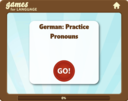
German Language Game: Practice Pronouns
Quick German Language Game: German Pronouns
Level: Elemntary (A2)
Playing Time: 4 minutes
A quick interactive "Word Invader" German Language Game to practice pronouns.
Review the subject, indirect object, and direct object forms:
• ich mir mich (I, to me, me)
• du dir dich (you, to you, you [familiar])
• er ihm ihn (he, to him, him)
• sie, ihr sie (she, to her, her)
• wir uns uns (we, to us, us)
• ihr euch euch (you-all, to you-all, you-all)
• sie ihnen sie (they, to them, them)
• Sie Ihnen sie (you, to you, you [formal])
Note that "uns" means both "us" and "to us" and "euch" means both "to you-all" and the direct object "you-all".
Vocabulary
In the German Pronoun Word Invader Game, you'll put together 12 simple sentences using subject, indirect object, and direct object pronouns. Other vocabulary items in the game:
• kennen - to know
• zeigen - to show
• geben - to give
• anrufen - to call (by phone)
• suchen - to look for
• sehen - to see
• sagen - to say, tell
• wollen - to want
• die Adresse - the address
• der Schlüssel - the key
• das Foto - the photo
• die Handynummer - the cell phone number
If you like our games, please SHARE us with your friends.
More Than a German Language Game
Don't forget, you can learn and practice German online for FREE with our 36-Scene German 1 Story: "Michael in Deutschland" and our 72-Scene German 2 Mystery Story Sequel: "Blüten in Berlin?"
("Blüten" means blossoms in German - but you'll find out that it has another, more sinister meaning).
Just login HERE.
And, if you have any language questions - don't hesitate to contact us!

Spanish Language Story Game: 5
Spanish Language Story: Part 5 of David's trip to Spain (El viaje de David 5 - En Sevilla).
Level: Low Intermediate (B1).
Playing Time: 6 1/2 minutes (The Story and Word Shoot Game)
David arrives by train in Seville. He takes a bus to Louis Morales Street and checks into the Hotel Meliá Lebreros, where he had made a reservation. In the few days that he's there, David visits the Giralda (the exquisite Bell Tower of the Cathedral of Seville), and the Torre del Oro (a watchtower on the left bank of the Guadalquivir river). With his new friends, he also spends an evening in the Barrio de Triana, a lively neighborhood with small streets and a history of attracting artisans and flamenco.
Hear and read Part 5 of David's trip in Spanish. It contains 140 basic words and phrases.
Try to listen without translating the words, as you play through the story.
To hear a sentence again, click on it (before continuing to the next screen).
"Shadow" each sentence by saying it along with (or just after) the native speaker.
That's an effective way to practice the sounds and rhythm of conversational Spanish.
Note: in context, words for "he, she, we" etc are often omitted in Spanish unless they are needed for clarity.
Shootout Game: 10 Key Verbs
• tomar - to take
• ayudar - to help
• costar - to cost
• tener - to have
• necesitar - to need
• conectar - to connect
• subir - to go up
• intentar - to try, attempt
• cenar - to have dinner
• ver - to see
You can roll over the translation on a desk- or laptop, but not on a phone or tablet.
Register or log in and go to Spanish 1, David en España, if you want to play the full 6-part story for free. You'll learn and practice 750 basic words and phases in the context of the story.

Spanish Language Story Game: 4
Spanish Language Story: Part 4 of David's trip to Spain (El viaje de David 4 - En Granada).
Level: Low Intermediate (B1).
Playing Time: 6 minutes (The Story and Word Shoot Game)
David has arrived in Granada. He finds the street where Daniel and his girlfriend Rosa live, and she opens the door. Rosa's sister Ana is also visiting and introductions follow. When Daniel comes home, they order pizza. During the next days, his friends join David for a visit to the Alhambra. (And David finds out that the American author Washington Irving spent three months there in 1829, to write "Tales of the Alhambra"). They also walk around the university (founded in 1531 and one of the oldest in Europe). Finally, they go up to el Mirador de San Cristóbal, a spectacular viewpoint that overlooks the city.
Hear and read Part 4 of David's trip in Spanish. It contains 130 basic words and phrases.
As you play the story, listen to the speaker without translating the words.
To hear a sentence again, click on it (before continuing to the next screen).
"Shadow" each sentence by saying it along with (or just after) the native speaker.
That's an effective way to practice the sounds and rhythm of conversational Spanish.
Note: in context, words for "he, she, we" etc are often omitted in Spanish unless they are needed for clarity.
Shootout Game: 10 Key Verbs
• encontrar - to find
• abrir - to open
• entrar - to enter, go in
• ver - to see
• tutear - to say "tú" to someone
• estudiar - to study
• llegar - to arrive
• pensar - to think
• pedir - to order
• vivir - to live
On a desk- or laptop you can roll over the translation (but not on a phone or tablet).
To practice the words and phrases of the whole story for free, register or log in and go to Spanish 1, David en España.

Spanish Language Story Game: 3
Spanish Language Story: Part 3 of David's trip to Spain (El viaje de David 3 - En el tren).
Level: Low Intermediate (B1).
Playing Time: 6 minutes (The Story and Word Shoot Game)
Image of Barcelona-Sants Train Station by Michael Descharles on unsplash.com
David's aunt takes him to Barcelona's train station. He buys a one-way ticket to Granada and goes to the platform to wait for the train. With the Arco train, it's a long trip. In Granada he calls Daniel's landline. He's a friend David had met as a student in Boston. Daniel's girlfriend Rosa answers and gives him directions to their place.
Hear and read Part 3 of David's trip in Spanish. It contains 120 basic words and phrases.
As you play the story, try to listen without translating the words.
To hear a sentence again, click on it (before continuing to the next screen).
Say each sentence after (or along with) the native speaker to practice its music and rhythm.
Note: in context, words for "he, she, we" etc are often omitted in Spanish unless they are needed for clarity.
Shootout Game: 10 Key Verbs
• llevar - to take, bring
• tomar - to take, grab
• salir - to leave
• saber - to know
• esperar - to wait
• llegar - to arrive
• comenzar - to begin
• contestar - to answer
• llamar - to call
• encontrar - to find
On a desk- or laptop you can roll over the translation (but not on a phone or tablet).
To practice all of the words and phrases of the story for free, register or log in and go to Spanish 1, David en España.
French Language Game: Faire - Present Tense
Quick French Language Game: "faire" (to do, make) - present tense
(Photo by GG LeMere on unsplash)
Level: Elementary (A2)
Playing Time: 4 minutes
Play this fun interactive online game to practice "faire", present tense.
You'll also become familiar with some everyday expressions with "faire".
To sharpen your pronunciation, say the French OUT LOUD right after or along with the speaker.
Before you start, quickly go through the forms and sentences below.
This game works best for mid-Beginners who want to learn and review conversational French.
Play on a Computer or Tablet.
Present Tense of "faire"
- je fais - I do, make
- tu fais - you do, make (familiar)
- il/elle fait - it/he/she does, makes
- nous faisons - we do, make
- vous faites - you do, make (formal & plural)
- ils/elles font - they make (m/f)
Sentences and Expressions with "faire"
- J'aimerais faire une réservation. - I'd like to make a reservation.
- Il fait ses études à Paris. - He is doing his studies in Paris.
- Nous allons faire une promenade. - We're going to take a walk.
- Que faites-vous ? - What are you doing? (formal/plural)
- Ils font leurs courses. - They're doing their shopping.
- Enchanté de faire votre connaissance. - Delighted to meet you. (formal)
- Il fait beau. - It's lovely weather.
- Ça fait longtemps ! - It's been a long time!
- Ça fait vingt et un euros. - That's twenty-one euros. (amount to pay)
- Moi aussi, ça me fait plaisir de te revoir. - Me too, I'm happy to see you again.
If you like our games, please SHARE us with your friends.
More Than a French Language Game
And don't forget: You can practice French online for FREE with our gamified 36-Scene French 1 Travel-Story: "Daniel en France". The story consists of 350 sentences (Level: A2 High Beginner - B1 Low Intermediate), to build your vocabulary and improve your conversational pronunciation.
In it you learn and practice all the words, phrases and sentences you also hear in the podcasts.
Just login HERE.
"The Story" and easy games will let you forget that you're actually learning French!
If you have any language questions - don't hesitate to contact us!
